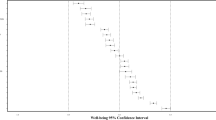Abstract
Most of the existing multidimensional poverty indices are constructed in two steps. First, the deprivation felt by each individual with respect to each attribute is computed. Then, these deprivations are aggregated to form a summary index of the overall deprivation. This paper explores properties for the aggregation stage and analyzes their implications. The axioms we propose are necessary and sufficient to characterize a procedure to aggregate the different individuals’ deprivations in order to measure the extent of deprivation in society.
Similar content being viewed by others
References
Aczél, J.: Lectures on Functional Equations and Their Applications. Academic, New York (1966)
Atkinson, A.B.: Multidimensional deprivation: contrasting social welfare and counting approaches. J. Econ. Inequal. 1, 51–65 (2003)
Blackorby, C., Donaldson, D.: Ratio-scale and translation-scale full interpersonal comparability without domain restrictions: admissible social-evaluation functions. Int. Econ. Rev. 23(2), 249–268 (1982)
Bourguignon, F., Chakravarty, S.: The measurement of multidimensional poverty. J. Econ. Inequal. 1, 25–49 (2003)
Chakravarty, S.R.: Inequality, polarization and poverty; advances in distributional analysis. In: Silber, J. (ed.) Series: Economic Studies in Inequality, Social Exclusion and Well-Being, p. 6. Springer, New York (2009)
Chakravarty, S.R., Mukherjee, D., Ranade, R.R.: On the family of subgroup and factor decomposable measures of multidimensional poverty. Res. Econ. Inequal. 8, 175–194 (1998)
Eichhorn, W.: Funtional Equations in Economics. Addison-Wesley, Boston (1978)
Gorman, W.M.: The structure of utility functions. Rev. Econ. Stud. 32, 369–390 (1968)
Maasoumi, E., Lugo, M.A.: The information basis of multivariate poverty assessments. In: Kakwani, N., Silber, J. (eds.) Quantitative Approaches to Multidimensional Poverty Measurement, pp. 1–29. Palgrave Macmillan, New York (2008)
Pattanaik, P.K., Reddy, S.G., Xu, Y.: On procedures for measuring deprivation and living standards of societies in a multi-attribute framework. Working Paper 08-02, Andrew Young School of Policy Studies, Georgia State University (2007)
Tsui, K.Y.: Multidimensional poverty indices. Soc. Choice Welf. 19, 69–93 (2002)
Zheng, B.: Unit-consistent decomposable inequality measures. Economica 74, 97–111 (2007)
Author information
Authors and Affiliations
Corresponding author
Rights and permissions
About this article
Cite this article
Lasso de la Vega, M.C., Urrutia, A. Characterizing how to aggregate the individuals’ deprivations in a multidimensional framework. J Econ Inequal 9, 183–194 (2011). https://doi.org/10.1007/s10888-010-9139-y
Received:
Accepted:
Published:
Issue Date:
DOI: https://doi.org/10.1007/s10888-010-9139-y




